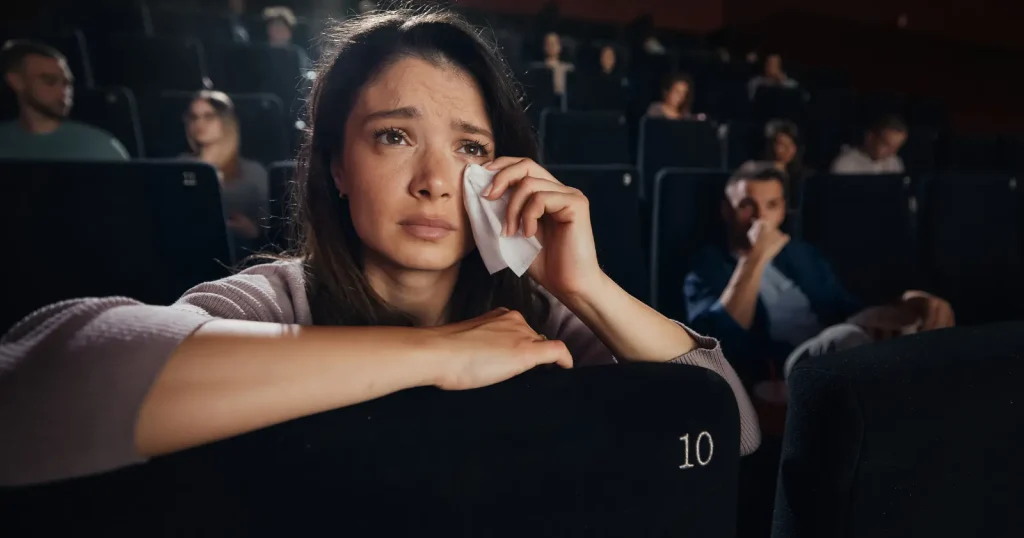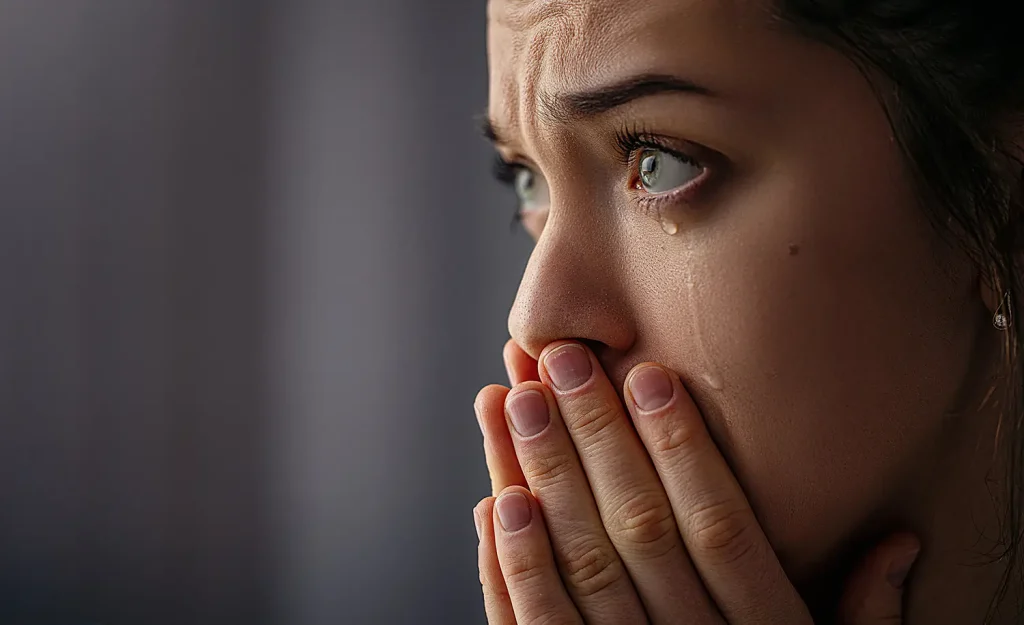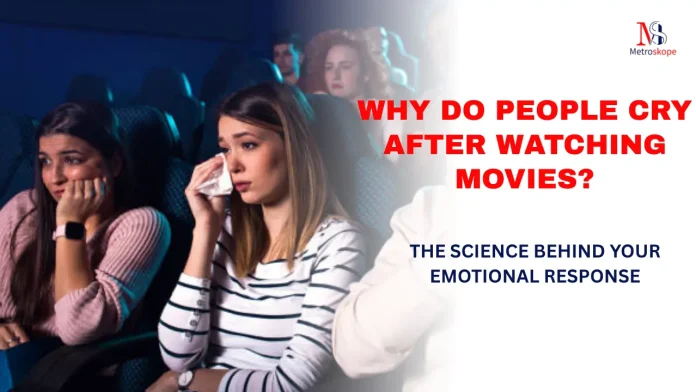Have you ever found yourself reaching for tissues during a particularly emotional movie scene? Maybe you’ve tried to hide those tears from your friends, thinking they might judge you for being “too sensitive.”
Well, here’s some fantastic news that might change your perspective entirely: crying during movies is actually a sign of emotional strength, not weakness.
Recent research from neuroscientist Paul J. Zak at Claremont Graduate University reveals that people who shed tears during films are more empathetic and emotionally intelligent than those who remain dry-eyed.
So the next time someone teases you for crying during Titanic or Marley and Me, you can confidently tell them you’re just demonstrating superior emotional processing skills!
The Fascinating Science Behind Movie Tears
The Oxytocin Connection
When you cry during a movie, your brain is essentially throwing a neurochemical party. The star of this show is oxytocin, often called the “love hormone”.
This powerful chemical messenger doesn’t just help mothers bond with their babies or couples feel closer together – it’s also responsible for those unexpected tears during your favorite tearjerker.
Oxytocin acts like a “volume dial” for your emotions, amplifying whatever you’re currently experiencing.

When you watch a compelling story unfold on screen, this hormone gets triggered by the social connections you feel with the characters, even though you rationally know they’re fictional.
“Crying in the movies and in response to really compelling stories, it actually shows you have a strong empathy response and empathy is one of the five key characteristics of emotional intelligence, so it’s a strength.” – Professor Deborah Rickwood, University of Canberra
Mirror Neurons: Your Brain’s Copy-Paste Function
Here’s where things get really interesting. Your brain contains special cells called mirror neurons that literally make you experience what you see others experiencing.
When you watch an actor portray grief, joy, or heartbreak, these neurons fire as if you’re actually going through those emotions yourself.
This isn’t just some quirky brain glitch – it’s an evolutionary advantage that helped our ancestors survive by understanding and predicting others’ behaviors.
Today, it means you can’t help but feel genuine sadness when watching a character lose someone they love, even though you know it’s all make-believe.
Why Movies Hit Harder Than Real Life
The Safety Factor
One of the most surprising discoveries in emotional research is that many people cry more easily during movies than during their own real-life traumatic experiences.
This seems counterintuitive, but there’s a brilliant psychological explanation.
In real life, your brain shifts into survival mode when something devastating happens. You’re too busy thinking about solutions, next steps, and coping strategies to fully process your emotions.
Your logical brain takes over while your emotional brain gets pushed to the background.
But when you’re watching a movie? You’re completely safe. You’re relaxed, comfortable, and not responsible for fixing anything.
This gives your emotional brain the space it needs to fully experience and process feelings.
| Real Life Crisis | Movie Watching |
|---|---|
| Survival mode activated | Safe and relaxed |
| Focus on problem-solving | No responsibility for outcomes |
| Emotions suppressed | Emotions free to flow |
| Limited processing time | Full emotional engagement |
Emotional Displacement: The Hidden Release
Psychologists have identified something called emotional displacement – where feelings you couldn’t express in real situations find their way out through movies.
That time you stayed strong during a family crisis? Those unexpressed emotions don’t just disappear. They stay stored in your system until a movie about family loss gives them permission to flow.
This is why sometimes you might find yourself sobbing uncontrollably during a film that doesn’t seem that sad.
You’re not just crying for the fictional characters – you’re finally releasing your own stored-up grief, joy, or relief.
The Emotional Engineering of Films

How Movies Manipulate Your Feelings (In the Best Way)
Modern filmmakers are essentially emotional engineers.
They use every tool at their disposal to trigger your tear ducts:
- Musical scores that swell at precisely the right moment
- Lighting techniques that create intimate, vulnerable atmospheres
- Camera angles that bring you uncomfortably close to characters’ faces
- Pacing and timing that builds emotional tension to breaking points
These aren’t accidents – they’re carefully calculated decisions designed to activate your mirror neurons and flood your system with oxytocin.
It’s like an emotional roller coaster designed by scientists who understand exactly which buttons to push.
“Movies are designed to overload you emotionally. They pull at your heartstrings with music, lighting, storylines, facial expressions, and timing. It’s like a perfect storm for your emotions.” – Psychology researcher
Different Types of Movie Tears
It’s Not Just About Sadness
Here’s something that might surprise you: crying isn’t just about sadness. Your tear ducts can activate from:
- Joy (happy endings, reunions, victories)
- Relief (when characters escape danger)
- Awe (witnessing something beautiful or profound)
- Anger (injustice or frustration)
- Nostalgia (remembering your own experiences)
This explains why you might cry during action movies, comedies, or even documentaries.
Your emotional system is responding to whatever overwhelms it, regardless of whether that’s positive or negative stimulation.
The Health Benefits of Movie Crying
Your Body’s Natural Reset Button
Crying during movies isn’t just emotionally beneficial – it’s physically good for you too. Research shows that emotional tears help your body:
- Release stress hormones and toxins from your system
- Trigger endorphin production for natural mood improvement
- Restore emotional balance and homeostasis
- Process and integrate difficult experiences
One fascinating study found that people who cried during emotional films reported feeling significantly better 90 minutes after the movie ended, even though they felt worse immediately afterward.
It’s like your emotional system needs to dip down before bouncing back stronger.
Age, Experience, and Emotional Responses
Why You Might Cry More As You Get Older
Many people notice they become more emotional during movies as they age. This isn’t because you’re becoming “softer” – it’s because you have more life experiences to connect with what you’re seeing on screen.
Parents often report crying more during films about family relationships after having children. People who’ve experienced loss become more sensitive to grief storylines. Your expanding emotional database gives movies more material to work with.
“The older you get, the more experience of social connections, the more things you pay attention to that are meaningful to you, so more things then emotionally arouse you.” – Professor Deborah Rickwood
What If You Don’t Cry During Movies?
Different Responses, Same Humanity
If you’re someone who rarely tears up during films, don’t worry – you’re not emotionally deficient. People respond differently based on:
- Personal coping styles and emotional regulation habits
- Life experiences and what resonates with your story
- Attention and absorption levels during viewing
- Cultural background and learned emotional expressions
Some people express empathy through other responses like tensed muscles, increased heart rate, or deep thoughtfulness rather than tears.
Embrace Your Movie Tears
The next time you find yourself crying during a movie, remember that you’re experiencing something uniquely human and scientifically fascinating. Your brain is demonstrating its capacity for:
- Deep empathy and emotional connection
- Advanced social processing and understanding
- Healthy emotional regulation and release
- Strong emotional intelligence and awareness
Movie tears are not a sign of weakness – they’re evidence of a well-functioning, emotionally sophisticated human being. So grab those tissues with pride, and let your oxytocin-fueled emotional responses flow freely.
Your brain knows what it’s doing, even when your logical mind thinks you’re being “silly” for crying over fictional characters.

